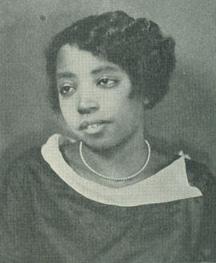BLACK SOCIAL HISTORY
Marita Bonner
Marita Bonner (June 16, 1899 – 1971) (also known as Marieta Bonner) was an African-American writer, essayist, and playwright who is commonly associated with the Harlem Renaissance. She was also known as Marita Occomy, Marita Odette Bonner, Marita Odette Bonner Occomy, Marita Bonner Occomy, Joseph Maree Andrew. On December 29, 1921 along with 15 other women, she chartered the Iota Chapter of Delta Sigma Theta sorority.[1]
Influences on the Harlem Renaissance[edit]
Bonner contributed a variety of things to the Harlem Renaissance. Her writings addressed the struggles of people who lived outside of Harlem. Her greatest involvement was her emphasis on claiming a strong racial and gender identity. She argued against sexism and racism and advised other black women to remain silent in order to gain understanding, knowledge, and truth to fight the oppressions of race and gender. She also encouraged African Americans to use the weapons of knowledge, teaching, and writing to overcome inequalities. Unlike most Renaissance writers, she focused her writings on issues in and around Chicago. Several of Bonner's short stories addressed the barriers that African-American women faced when they attempted to follow the Harlem Renaissance's call for self-improvement through education and issues surrounding discrimination, religion, family, and poverty.
Bibliography
Short stories
- "The Hands - A Story." Opportunity 3 (August 1925): 235-37.
- "The Prison-Bound." Crisis 32 (September 1926): 225-26.
- "Nothing New." Crisis 33 (November 1926): 17-20.
- "One Boy's Story." Crisis 34 (November 1927): 297-99, 316-20 (pseudonym: Joseph Maree Andrew).
- "Drab Rambles." Crisis 34 (December 1927): 335-36, 354-56.
- "A Possible Triad of Black Notes, Part One." Opportunity 11 (July 1933): 205-07.
- "A Possible Triad of Black Notes, Part Two: Of Jimmie Harris." Opportunity 11 (August 1933): 242-44.
- "A Possible Triad of Black Notes, Part Three: Three Tales of Living Corner Store." Opportunity 11 (September 1933): 269-71.
- "Tin Can." Opportunity 12 (July 1934): 202-205, (August 1934): 236-40.
- " A Sealed Pod." Opportunity 14 (March 1936): 88-91.
- "Black Fronts." Opportunity 16 (July 1938): 210-14.
- "Hate is Nothing." Crisis 45 (December 1938): 388-90, 394, 403-04 (pseudonym: Joyce M. Reed).
- "The Makin's." Opportunity 17 (January 1939): 18-21.
- "The Whipping." Crisis 46 (January 1939): 172-74.
- "Hongry Fire." Crisis 46 (December 1939): 360-62, 376-77.
- "Patch Quilt." Crisis 47 (March 1940): 71, 72, 92.
- "One True Love." Crisis 48 (February 1941): 46-47, 58-59.
Essays
- "The Young Blood Hungers." Crisis 35 (May 1928): 151, 172.
- "Review of Autumn Love Cycle, by Georgia Douglas Johnson." Opportuntiy 7 (April 1929): 130.
Drama
- "The Pot-Maker (A Play to be Read)". Opportunity 5 (February 1927): 43-46.
- "Exit - An Illusion". Crisis 36 (October 1929): 335-36, 352.






















































































No comments:
Post a Comment